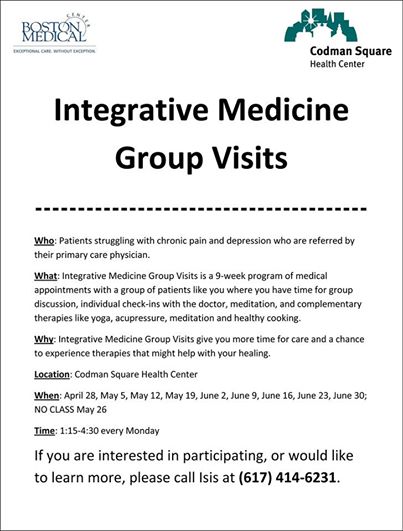4 Reasons to Consider Integrative Medicine Group Clinic Visits
By Glenn Sabin

If your practice accepts third-party payer reimbursements, consider group clinic visits as a unique opportunity to cost-effectively deliver important services with reasonable compensation.
I recently studied a range of group clinic visit options (aka shared medical appointments) while modeling an integrative health center for a large Florida-based orthopedic surgery group. The practice’s billing guru and I ran numbers predicated on various group session types, including: nutritional, exercise, general lifestyle and behavioral change counseling aimed at pre-surgical patients.
As anticipated, both Medicare and commercial reimbursement rates varied from state to state and county to county. While pleased to find reimbursements slightly greater overall than expected, the difficulty finding coverage information for several of the group program types really surprised us.
Though certainly not an exhaustive set of findings, here’s what we discovered looking at Medicare and Blue Cross Blue Shield (BCBS):
Group Clinical Visits
Focused on pre-surgical co-morbidities: diabetes, heart disease, obesity, hypertension.
CPT 99078
Medicare: No fee schedule or guidelines found.
Private Insurance: $14; no time published (BCBS).
Note: Counseling and education by a physician to a group; physician or otherwise certified provider (RD, RN, PA) with training in group settings. Scribe needs to be in room during sessions.
Group Medical Nutrition Therapy
CPT 97804; RD led.
Medicare: $15.62 per person, per 30 min session.
Private Insurance: $14.74 (BCBS).
Group Exercise Counseling
CPT 99411: 30 min.
CPT 99412: 60 min.
Medicare: No fee schedule or guidelines found.
Private Insurance: $16.58 (11); $22.20 (12).
Private insurance coverage guidelines unavailable from BCBS.
For payers, the significant savings potential is clear.
Here are four reasons to consider offering group clinic visits:
1. It Supports Larger Patient Panels and Group Sizes
Group sizes vary and are scalable depending on the type. Regardless, most require a scribe, physician or another qualified practitioner. Delivered in a group setting, even those interventions that typically command a lower rate of reimbursement (i.e., exercise and nutrition counseling) can prove commercially viable and boost your bottom line. But to guarantee success, it’s vitally important to keep patients consistently engaged by making sure your team communicates and manages the process effectively.
Enjoying this article? Subscribe and get our latest, delivered straight to your inbox.
2. It Provides Crucial Patient Psychosocial Interaction
The single greatest challenge to delivering standard one-on-one lifestyle, functional and integrative medicine intervention lies in maintaining patient adherence; not in communicating value or executing process. In reality most patients ‘say’ they’ll make the necessary behavioral modifications for success but, alone, they won’t. However, an interesting thing happens when you place social animals (aka humans) who share a common concern together in a room: they naturally begin to open up, share stories and offer mutual support; in effect a support group managed by a specialized practitioner. Though some patients may be a little uneasy by a perceived lack of privacy, their concerns quickly diminish to the extent the group spawns healthy social interaction, mutual support and even budding friendships. The reciprocal support intrinsic in a group setting can make a world of difference!
3. A Perfect Match for Accountable Care Organizations
If you’re a certified ACO incented by Medicare to shorten inpatient stays, reduce hospital readmissions and improve patient satisfaction ratings, you’re an excellent candidate. Appropriate group clinic sessions (including exercise and nutrition) offered as pre-surgical interventions that complement, not replace, routine preadmission physicals help ensure the highest levels of reimbursement.
4. A Perfect Match for Patient Centered Medical Homes
If you’re a PCMH providing a team care approach while keeping patients at the center of the health delivery process, think about the potential for achieving both delivery and cost efficiencies. Could group visits be tomorrow’s model for successfully improving population health, in volume, in a PCMH setting?
Dr. Edward Hoffsinger, long considered the pioneer of group clinic visits, regularly lectures on the topic and I recently read his excellent book, Running Group Visits in Your Practice. This impressive tome is widely regarded as the subject’s definitive textbook and essential reading for those seriously looking to establish a group clinic program.
Does your clinic or center currently provide group clinic visits? Are you in the process of assessing its feasibility? Let’s keep the conversation going by leaving a comment below or on the social media platform you’re engaging this post.
About FON
FON is a leading integrative health and medicine business development and strategy consulting firm. FON specializes in custom solutions for growing patient volume, developing programs, and increasing product sales. Our practical business models are driven by innovative marketing, clear messaging, and customer engagement via branded storytelling.
Contact us today to schedule a complimentary 30-minute consultation to discuss your business development or personal brand needs.

Glenn Sabin, founder of FON and author of n of 1, is a nationally recognized thought leader who positions health innovators, enterprises, and organizations for sustainable growth. Leveraging deep experience in media, strategy, marketing, and business development—and his own compelling cancer journey—he champions personalized medicine and the generation of real-world data and evidence to help define a new, accessible standard of care.
Read Glenn’s story.




















